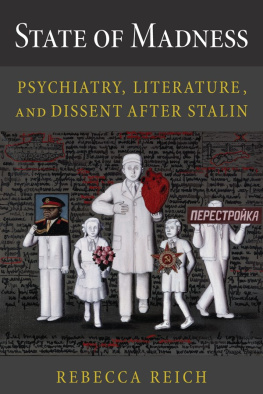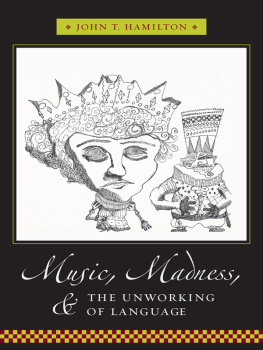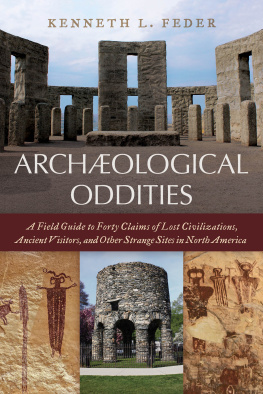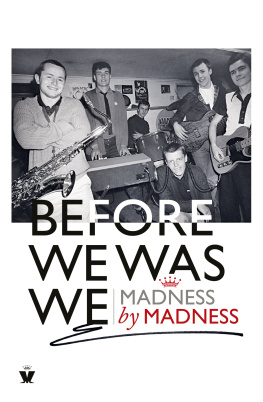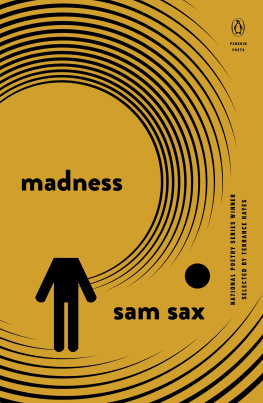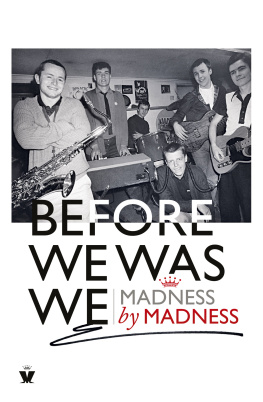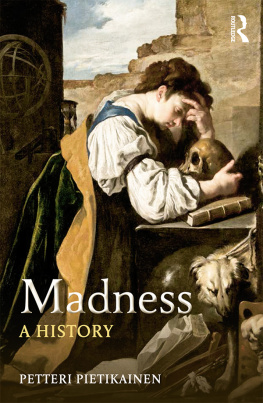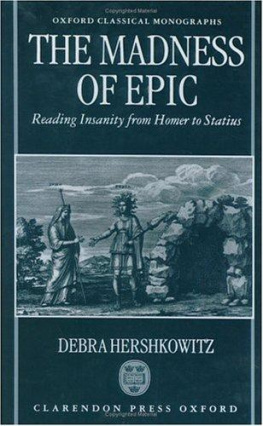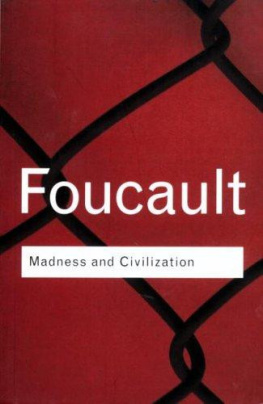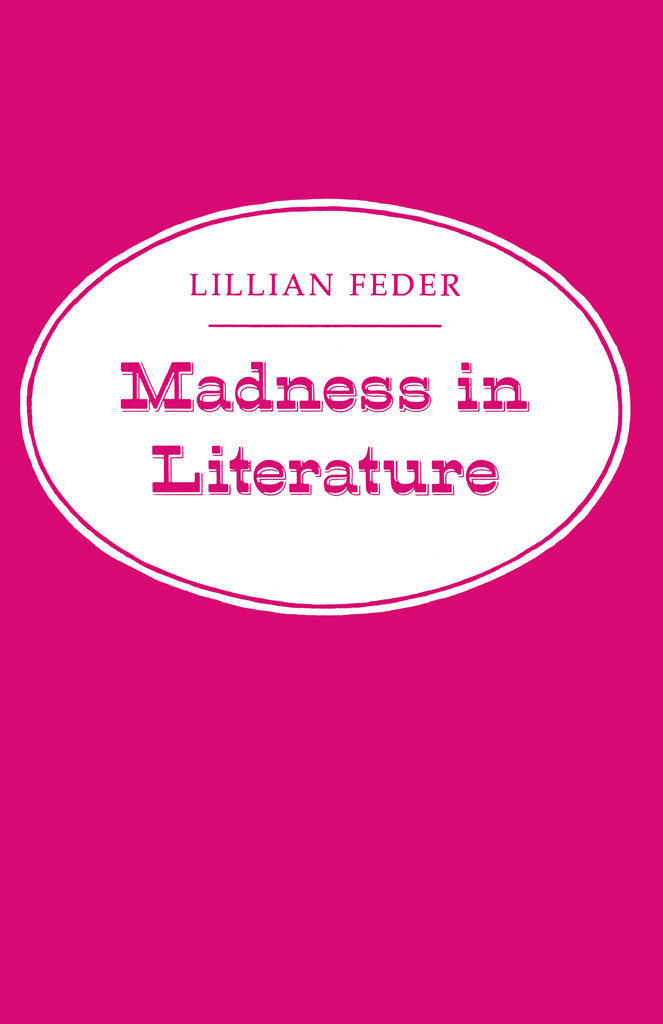MADNESS IN LITERATURE
Madness in
Literature
LILLIAN FEDER
Princeton University Press
PRINCETON, N.J.
Copyright 1980 by Princeton University Press
Published by Princeton University Press, Princeton, New Jersey In the United Kingdom:
Princeton University Press, Guildford, Surrey
All Rights Reserved
Library of Congress Cataloging in Publication Data will be found on the last printed page of this book
eISBN: 978-0-691-21973-8
R0
to my brother, Irving Leonard Feder
Acknowledgments
I am grateful to the National Endowment for the Humanities for granting me a Senior Fellowship in 1974-75 which provided free time for early work on this book. For their thoughtful assistance I wish to thank the librarians at Queens College and the Graduate Center of the City University of New York, Columbia University, the New York Public Library, Yale University, and the Library of Congress. Miss Miriam Brokaw, Associate Director and Editor, and Mrs. Arthur Sherwood, Literature Editor, at Princeton University Press, were interested in this book from its very inception. Their encouragement and counsel were invaluable during the years I worked on it. No author could be more fortunate in her editors. Dr. Rudolph Wittenberg offered expert guidance on psychoanalytic readings and theory. He read the entire manuscript and made many valuable suggestions. In writing this book, as with earlier ones, I relied on his wisdom and kindness. Conversations with Seymour Bernstein, as well as his brilliant recording of Beethoven's Opus 111, helped me to formulate its role in Thomas Mann's Dr. Faustus. Other friends and colleagues at Queens College and the Graduate School of the City University of New York who provided generous assistance in various fields are: Yvette Louria, Professor of French and Comparative Literature; Burton Pike, Professor of Comparative Literature and German; Mariam Slater, Professor of Anthropology; and Robert Miller and Michael Timko, Professors of English. Betty Rizzo, my former student and now Associate Professor of English at the City College of New York, was also most helpful. I hope that my work reflects the perspective I gained from the concern, sense of humor, and good judgment of my brother lrving Leonard Feder, and it is to him and our long friendship that I dedicate this book.
In somewhat different form sections of chapter v appeared in the Psychocultural Review 1, 2 (Spring 1977) and in Classical Mythology in Twentieth-Century Thought and Literature, Proceedings of the Comparative Literature Symposium, January 1978, ed. Wendell Aycock and Theodore Klein (Lubbock: Texas Tech University Press, 1980). I thank these publications for permission to reprint.
I am also grateful to the Beinecke Rare Book and Manuscript Library of Yale University for permission to quote from James Carkesse, Lucida Intervalla (London, 1679) and to the following for permission to quote from copyrighted materials:
Alfred A. Knopf, Inc. for excerpts from Thomas Mann, Death in Venice and Seven Other Stories, Copyright 1930, 1931, 1936 by Alfred A. Knopf, Inc. and Thomas Mann, Doctor Faustus, Copyright 1948 by Alfred A. Knopf, Inc., both books translated by H. T. Lowe-Porter. Excerpts from Doris Lessing, Briefing for a Descent into Hell, Copyright 1971 by Doris Lessing also reprinted by permission of Alfred A. Knopf.
Excerpts from Allen Ginsberg, Howl and Other Poems, Copyright 1956, 1959 by Allen Ginsberg, reprinted by permission of City Lights Books. Excerpts from Allen Ginsberg, Kaddish and Other Poems, Copyright 1961 by Allen Ginsberg, reprinted by permission of City Lights Books. Excerpts from Allen Ginsberg, Reality Sandwiches, Copyright 1963 by Allen Ginsberg, reprinted by permission of City Lights Books. Excerpts from Allen Ginsberg, Indian Journals, Copyright 1970 by Allen Ginsberg, reprinted by permission of City Lights Books. Excerpts from Allen Ginsberg, Mind Breaths, Copyright 1978 by Allen Ginsberg, reprinted by permission of City Lights Books. Excerpts from Allen Ginsberg, Journals Early Fifties Early Sixties, Copyright by Allen Ginsberg, reprinted by permission of Grove Press, Inc.
Excerpts from Wole Soyinka, The Bacchae of Euripides, Collected Plays 1, Wole Soyinka, and by permission of Oxford University Press.
Passim lines of poetry from "They Sing, They Sing," Copyright 1956 by Theodore Roethke, "The Pure Fury," Copyright 1958 by Theodore Roethke, "The Abyss," Copyright 1963 by Beatrice Roethke, Administratrix of the Estate of Theodore Roethke, "The Exorcism," all appear in the book The Collected Poems of Theodore Roethke. Reprinted by permission of Doubleday and Company, Inc. and Faber and Faber, Ltd.
Selections from The Dream Songs by John Berryman. Copyright 1959, 1962, 1963, 1964, 1965, 1966, 1967, 1968, 1969 by John Berryman. Reprinted with the permission of Farrar, Straus & Giroux, Inc. From Delusions, etc. by John Berryman. Copyright 1969, 1971 by John Berryman. Copyright 1972 by the Estate of John Berryman. From Love and Fame by John Berryman. Copyright 1970 by John Berryman. Reprinted with the permission of Farrar, Straus & Giroux and Faber and Faber, Ltd.
Selections from Antonin Artaud, Selected Writings. Translated from the French by Helen Weaver. Translation Copyright 1976 by Farrar, Straus & Giroux, Inc. Translated from the French uvres Compltes Editions Gallimard 1956, 1961, 1964, 1966, 1967, 1969, 1970, 1971, 1974. Reprinted with the permission of Farrar, Straus & Giroux, Inc. and with grateful acknowledgment for British rights to quote from The Collected Works of Antonin Artaud, published by John Calder (Publishers) Ltd.
Excerpts from Margaret Atwood, Surfacing reprinted by permission of Simon and Schuster.
Excerpts from Sylvia Plath, Ariel, Copyright 1965 by Ted Hughes, reprinted by permission of Harper and Row, Publishers, Inc. and Faber and Faber, Ltd. British rights by permission of Olwyn Hughes 1965 by Ted Hughes.
Preface
"I want to be human and I don't want to kill you. But I am very tired and a little confused. Now you have an inkling of a lunatic's mind at work." In this curious, self-reflective way, William Bse, one of the hijackers of an Air France plane en route to New York from Tel Aviv, addressed the passengers who had become his prisoners as they sat in the plane in Entebbe, Uganda on June 28, 1976. Although Bse may seem remote from the material of this book-the mad protagonists of literature and the writers for whom madness is a vehicle of self-revelationhis comments on his political action as a member of a group that identified itself as "The Popular Front for the Liberation of Palestine" are not irrelevant. Madness as a theme of myth and literature has always dealt with personal responses to environmental influences, which include political, social, and cultural pressures, or perhaps it would be more correct to say which exclude nothing.
In offering an "inkling" of enlightenment regarding the workings of the mind of the lunatic, Bse reflects a popular interest of the time, but it is by no means a new one. Imaginative writers from the fifth century B.C. to the present have always been concerned with madness as a revelation of processes of the human mind, indeed processes not limited to the minds of the insane. Still, Bse's remarks and their context have a particularly contemporary flavor. In his confessional tone, his superficial and somewhat pretentious self-exploration (considering the circumstances), and his apparent assumption that madness is an acceptable revolutionary trait, he seems to be speaking not only for himself but for a trend of his time.


